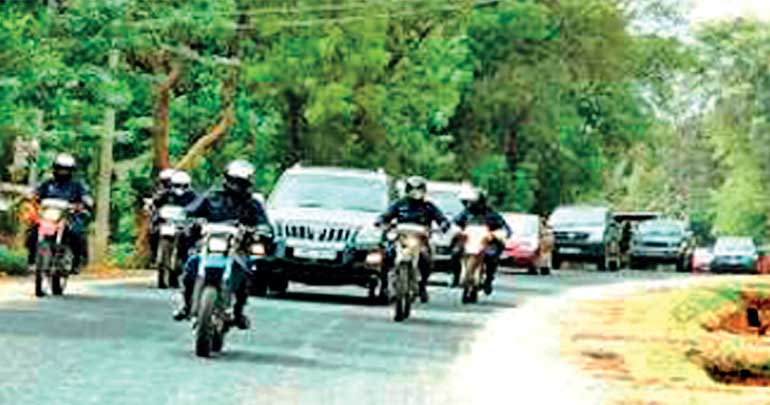Saturday Feb 21, 2026
Saturday Feb 21, 2026
Tuesday, 7 June 2016 00:01 - - {{hitsCtrl.values.hits}}
 Where real stature is lacking, common decency or integrity doubtful, a false show and intimidation are often resorted to
Where real stature is lacking, common decency or integrity doubtful, a false show and intimidation are often resorted to
If there was one war cry that united the unlike and hastily-arranged Yahapalanaya alliance, it was the charge against a regime which had come to epitomise family rule, abuse of State power and corruption in every form. The oppression united the varied Opposition groups; whatever their political differences, things could not be allowed to go on that way.
On 8 January 2015, the majority agreed. For an electorate long accustomed to voting on immediate economic factors, this was a welcome departure, a mandate based on good governance, ideals prevailing over self. In taking this path, the voter took a blind corner, but hopefully, with expectations for a better society.
Not all voters were convinced. As the voting showed, the issue was decided narrowly, a swing of two to three hundred thousand votes could have changed the verdict. Some analysts argue that had not the Muslims voted as a block, the result could have been different. It could also be argued that those who voted with the Rajapaksa camp were swayed by the sweeping propaganda unleashed by a suppliant Government media and even a compliant private media, the latter weakened by sporadic but brutal acts of intimidation as well as open bribery and inducements.
But as several previous elections have shown, media, powerful as an opinion former doubtlessly, is not the crucial factor. People have eyes and minds of their own. In a modern democracy, imperfect as it maybe, there are other means of being informed. More important, they have real life experience in both men and matters, have seen governments come and governments go.
Their experiences have turned many into cynics, a good number of voters preferring the firmness of an authoritarian regime to the shifting sands of incongruous political arrangements and perhaps spurious claims of ideals, taking it as a Scylla or Charybdis situation. Given the human material available, it is difficult to envisage anything better. Repeatedly, their expectations have been raised at election times, only to be dashed by an inevitable concoction of petty politics, personal agendas and corruption.
Our post-independence history has been the story of governments being elected with great fanfare, then a gradual descend-transforming the new government in to what it had replaced and eventually the denouement, greeted with relief now. All the hoo-ha notwithstanding, in the larger picture, in economic performance, social indications, political stability we remain a lower middle- range country. Who ruled and what they did, only of marginal value, if not harmful. There may be differences in the persons and broad policies of the various governments, but in their basic instincts, cultural inclinations and categories of thinking they are closer than normally given. One may only trust a kinsman; the other will see potential only in the old school tie.
The majority vote on 8 January 2015 was more a vote against, a rejection of a particular way of governing, than a clear endorsement of any other leader. They have had enough of the Rajapaksas. To the more sensitive citizen it was nauseating to observe Rajapaksa turning the country in to a family concern, a jump back to an era where one family, however limited and doubtful, held sway. And what a sway it was!
Standing at the Galle Face Green in a morning (actually, you were not allowed to stand there due to hysterical security concerns!) you will see several long convoys of the latest model limousines, tinted windows, chock-full of armed men whizz by. A bird may whisper to you: there goes madam to pray at the church, then goes one baby for rugby training, the second baby goes out to show the way to the younger generation (he is in his mid-twenties!), the third baby goes to play with his space crafts.
Later in the morning, comes another convoy transporting a brother, the eminence grise of the Government, on the way to decide on everything; policy, planning and implementation. Then comes the Defence czar brother; in formal Western attire, full of himself, claiming a public servant status – to the extreme discomfiture of the rest of the public service; the convoy even more hurried and purposeful. Finally, comes the “father” of all convoys, conveying the winner of the war, the incomparable leader of men, alpha male; outriders, ambulances and fire engines, the full works, it was a show in itself.
One could have accounted this comic overkill to a deep-rooted sense of inadequacy. Where real stature is lacking, common decency or integrity doubtful, a false show and intimidation are often resorted to. But it did not stop at the circus of the “first” family. Before long, the extended family was bossing most of the State machinery. Shadowy, second-rate relatives were brought out of their obscurity and placed in the highest positions in the government. Several of our ambassadors, in the most important countries in the world at that, were such relatives.
An ambassador so appointed was found to be collecting a commission from the seller, when purchasing a land for the embassy! His punishment – transfer to a new country, but again as ambassador! The qualification of another relative to be appointed ambassador was that he ran a small restaurant in the host country, while also doing various shady deals. Even the President’s in-laws were blessed with high appointments. A mediocre planter was appointed to run one of the most burdened Government-owned institutions. Those who knew the person well were numb with incredulity. They could not believe that an elected President could do this to the country.
On 8 January 2015, the voter decided to show the door to the Rajapaksa regime. It was a hopeful vote, placing their trust in a motley coalition only put together weeks before.
Obviously, that mandate demands that the misdeeds of the Rajapaksa regime are laid bare before the people in full. A clear message must be given to the abusers of power as well as the corrupt that their ways are no longer to be winked at. The legitimacy  of this Government rests on doing just that.
of this Government rests on doing just that.
After one-and-a-half years of dilly-dallying, it appears now that there are impediments in the law which prevent this from happening or will happen only in a watered-down manner. It seems that either the laws of the land are not adequate or the Government’s prosecutorial arm is not competent enough to fully implement the mandate, a whole system out of line with the march of history.
Herein we face the ultimate irony of our times.
There are no politicians in this country who have got poorer serving masses. On the other hand, their lifestyles change drastically for the better, after taking to politics. The politician and his family are destined for a huge social climb, becoming gentrified in the course of one political career.
There are no creature comforts denied to them, chauffeur-driven cars, houses, telephones, domestic aids to priority at any and every event becomes their entitlement. Every child of a politician attends an elite Colombo school. After finishing school, they go to expensive universities in countries like America, Australia or UK. When they return to Colombo on holiday, the boys now speaking the foreign lingo, go around the night clubs with a detail of Government provided security and sometimes beat up other revellers.
If the politician suffers a minor ailment like a stomach upset, usually caused by the unaccustomed rich and heavy food he now consumes, the man will be flown to a state-of-the-art hospital in Singapore to be treated, for all the tests to be done and of course a good rest. Although by now he can well afford it, the bill will be settled by the President’s Fund. In any event, there will so many well-wishers competing to pick up the bill. It is said that when a Minister was admitted to a Singaporean hospital recently, there were about 100 anxious well-wishers who flew all the way to the Lion City to bolster his morale and pray for his quick recovery.
On a simple asset betterment test, no politician in Sri Lanka can explain how he sustains his lifestyle with an MP’s salary. There are many laws that require one to explain the high lifestyle of the family, when it is obviously beyond his declared income and assets. In all civilised countries accepting graft, bribery, gifts, inducements and favours by politicians and public officers is illegal. Sri Lanka is not an exception.
But we have now become a fiction country. We know corruption is rife but no politician is guilty. Even if there is some evidence of wrongdoing, it is generally the functionaries and political lackeys who have to take the blame.
Either the law is an ass, or we live a fiction.